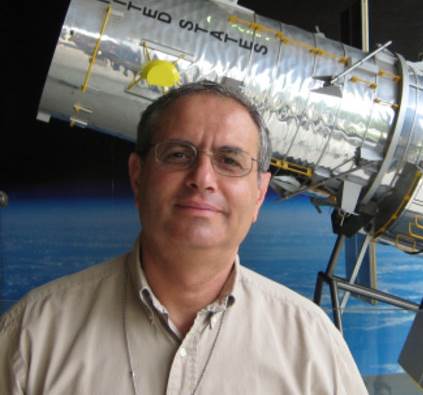Professor Vladimir Airapetian
Vladimir Airapetian, Ph.D. is Senior Astrophysicist at the NASA Heliophysics Science Division (HSD), Research Professor at the American University in DC, and faculty member at Embry-Riddle Aeronautical University. He is an active member of the International Astronomical Union and since 2008, Vladimir has been Research Associate Professor at the Department of Computational and Data Sciences at George Mason University.
Vladimir is leading an international effort to understand the effects of exoplanetary space weather on climate and habitability of terrestrial type exoplanets using a multi-observatory observing efforts and numerical simulation techniques.
He specializes in MHD modeling of solar and stellar winds, extreme coronal mass ejection events from the current and early Sun, and their effects on Earth’s magnetosphere, ionosphere, and thermosphere. His latest activity includes the application of state-of-the-art multidimensional heliophysics models to simulate environments of active stars and the young Sun to understand their impacts to the atmosphere of the early Earth and Mars. These studies laid the foundation for the concept of initiation of biological molecules on early Earth and resolution of the Faint Young Sun’s paradox.
He is currently involved in several projects as the Principal Investigator, among them are the NASA NExSS project Mission to Young Earth 2.0, NASA Exobiology project Prebiotic Chemistry of Early Earth and Mars on initiation of life on early Earth and Mars, TESS Cycle 1 mission proposal to characterize the signatures and effects of magnetic activity of young solar-type stars on nearby exoplanetary systems, Evolving Magnetic Lives of Young Suns, and the NASA/SEEC study, Measuring Magnetic Field Effects in Hot Gas Giants: Implications for Atmospheric Loss, to model the rate of atmospheric escape from terrestrial exoplanets driven by XUV flare emission and dynamic pressure of winds from young solar-type stars and M dwarfs.
As a Co-Investigator he is part of another TESS Cycle 1 proposal, Dynamics of Upper Atmospheres of Exoplanets Around Active K to M dwarfs as a Factor Terrestrial of Habitability to study effects of flares from M dwarfs on exoplanets, and of SEEC ISFM Habitability of Magnetic Exo Terrestrial Planets.
Vladimir is also leading an interdisciplinary team of heliophysicists, astrophysicists, planetary scientists, chemists, and biochemists from NASA Goddard, NASA Langley, Harvard University, and Tokyo Tech to understand how extreme space weather events from the active stars affect physics and chemistry of exoplanetary habitability at the SEEC ISFM project Impact of Extreme Space Weather on Climates of Terrestrial Type Exoplanets as the Science PI.
Vladimir earned his Bachelor’s Degree of Science with a major in Physics from Yerevan State University and then earned his Master’s Degree of Science in Astronomy in 1982 from Yerevan State University. He earned his Ph.D. in theoretical astrophysics from Byurakan Astrophysical Observatory & Kurchatov Energy Center in Armenia in 1989. He has over 25 years of experience in theoretical astrophysics, heliophysics, and astrobiology.
Vladimir was Research Associate Professor at George Mason University between 2008 and 2014, and he also taught the Online Introductory Astronomy course at Capella University.
Vladimir is a full member of the International Astronomical Union since 2012, of the American Geophysical Union since 2015, of the Solar Physics Division of the AAS since 2008, and of the American Astronomical Society (AAS) since 1995. He is also a member of the Steering Committee at NExSS, of PCE3 NASA Astrobiology Research Coordination Networks, and also a member of the leadership team of Sellers Exoplanet Environment Collaboration (SEEC) team.
Visit his LinkedIn profile, his NASA profile page, International Astronomical Union page, his American University profile, and Google Scholar page. Follow him on Facebook and ResearchGate.
